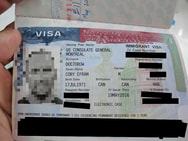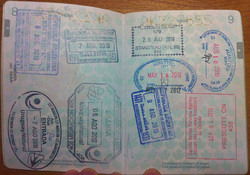
One of those mistakes is staying outside of the US for too long. LPRs are allowed travel internationally and return to the US with their green card and passport. However, they must be careful with how much time they are spending outside of the US. If an LPR spends more than a year continuously outside of the US, their green card will automatically become invalid and USCIS will consider that they have abandoned their US residency. If an LPR travels for more than six months but less than a year, US immigration officers may question them on the reason for their trip and ask them to prove ties in the US. One way to avoid unintentionally abandoning their United States residency is by receiving a re-entry permit.
A re-entry permit allows LPR to lawfully travel internationally for up to two years, and eliminates the need to obtain a returning resident visa. While the permit does not stop all suspicion that a person has abandoned their residency, it can be used as proof that they did not intend to do so. The re-entry permit is also recommended for residents that cannot or wish not to get a passport from their home country and need to travel outside of the US. It is recognized by many other countries as a recognized travel document, but one should always check each country’s documentation requirements first before traveling.
To apply for a re-entry permit, an applicant must fill out Form I-131 and must it while in the United States and 60 days before traveling. USCIS does not require individuals to remain in the US while their application is pending, but it is strongly recommended that an individual does. If the USCIS requests the applicant to complete their biometrics (fingerprints and photos), the applicant will have to complete them in the US. Once the biometrics process is complete, the applicant will be allowed to travel outside of the US and request that if their permit is approved to be sent to a US embassy, consulate, or a Department of Homeland Security office in the country they are in. Permits are only valid for 2 years after the date of issue, and cannot be extended or reissued. LPR can apply for a new one. However, if their current permit is still valid, the permit will need to be turned in to USCIS before applying for a new one. LPR that have to leave the US for an extended period of time for employment purpose can fill out Form N-470. This form allows LPR to preserve their status for naturalization purpose, but there are restrictions on the types of employment USCIS will accept.
Obtaining a re-entry permit can lessen the suspicion that LPR have abandoned their residency, yet it does not protect them from the other ways they might lose their status. LPR should follow these six recommendations:
- First, LPR should avoid becoming legal residents in another country. If they do, USCIS may consider that the immigrant has abandoned their legal status in the US.
- Second, LPR should try to remain in the US for extended periods of time between each period outside of the US and keep stays in other countries temporary.
- Third, LPR should develop and maintain ties in the US. This can be done through family, employment, financial, or property. Documentations of ties should be kept, such as: income tax returns, valid US driver’s license, registration and attendance at a US school, and evidence of ownership or lease of a property. Failure to filing income tax can raise a huge red flag to USCIS.
- Fourth and equally as important, LPR should minimize their ties in other countries. They should avoid owning property internationally, being employed abroad, or getting involved in politics in other countries.
- Fifth, while returning back to the US, LPR should be prepared to explain the reason for the trip and the length of their trip.
- Lastly, LPR should never sign Form I-407 - even if they are pressured to do so by border officials. This form is used to abandon one’s lawful permanent resident status, and once signed can be very difficult to prove that someone had no intention to abandon their residency.
If you still have any questions about how not to unintentionally abandon one’s lawful permanent resident status or green card, please consult with an attorney who will be able to evaluate your individual circumstance and provide you with individual answers and recommendations.
-Sydney Wilson
HMA Legal Intern, Spring 2018










 RSS Feed
RSS Feed
